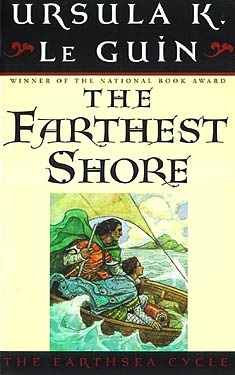Ursula K.
LeGuin
Completed 11/12/2018,
Reviewed 11/12/2018
3 stars
This is the
third book of the original Earthsea Trilogy.
It’s by far the toughest of the three books. It spends a lot of time on the difficult
journey of the two main characters and poses philosophical questions about life
and death. I had a much tougher time
getting into the story and the characters than I did in the first two books. I even had a tough time with the prose. It felt like LeGuin was trying too hard to
write an ultimate conclusion to the trilogy.
 Taking place
quite a while after “The Tombs of Atuan”, magic and true names seem to be
disappearing from Earthsea. Mages in
different parts of the archipelago are being ostracized or going insane from
their inability to use magic or invoke true names. Sparrowhawk, now an Archmage, goes on a quest
to find the source of the evil and put a stop to it. He takes along Arren, a young prince, as his
companion, for Sparrowhawk has foreseen that it is necessary to bring him
along. Their quest takes them on a
journey to the farthest shore at the end of the world where they must confront
the ultimate evil.
Taking place
quite a while after “The Tombs of Atuan”, magic and true names seem to be
disappearing from Earthsea. Mages in
different parts of the archipelago are being ostracized or going insane from
their inability to use magic or invoke true names. Sparrowhawk, now an Archmage, goes on a quest
to find the source of the evil and put a stop to it. He takes along Arren, a young prince, as his
companion, for Sparrowhawk has foreseen that it is necessary to bring him
along. Their quest takes them on a
journey to the farthest shore at the end of the world where they must confront
the ultimate evil.
The book is
told from Arren’s point of view. Like
the main characters of the previous two books, Arren is young. He is filled with angst, not normal teen
angst, but an existential angst that throws into question his decision to
follow Sparrowhawk. He questions the use
and non-use of magic in small things like conjuring of winds to push their boat
along all the way up to the granting of eternal life. He despairs in the middle of the journey,
questioning Sparrowhawk’s sanity, but then is filled with hope and loyalty as
he comes to his senses.
Sparrowhawk
is now an old man. He’s no longer the
brash, young apprentice as in the first book, nor the well-humored mentor of
the second book. Here, he’s quiet and
introspective, not saying much unless he is prodded by Arren. And that’s a shame, because he’s not as
interesting in this novel as he was in the first two. And for all his angst, I don’t feel like
Arren is that interesting either. Maybe
it’s because their journey is so long and relatively uneventful.
I give this
book three stars out of five. Like the
previous two books, it is low on plot, but this one is high on philosophy,
which I found to be a bit of a slog. It seems
like blasphemy to give LeGuin three stars, but not every book can be a home
run. Despite not caring much for this
book, I’m still looking forward to the next three because they were written so
much later. It will be interesting to
see where she goes with the next books.
No comments:
Post a Comment